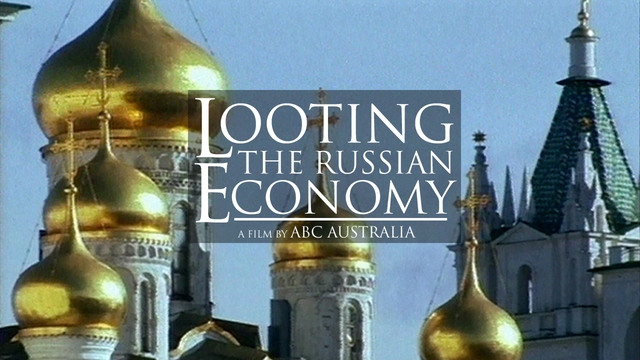Looting the Russian Economy
Money laundering has stripped Russia of its assets - and the West could be to blame
 It's been called the greatest theft ever. In the past decade between $200 billion and $500 billion has been gouged from the Russian economy. Most of the money has ended up in rich Western nations.
It's been called the greatest theft ever. In the past decade between $200 billion and $500 billion has been gouged from the Russian economy. Most of the money has ended up in rich Western nations.
This is a story about the money laundering game played at the very highest international level. It's about Russian gangsters, corrupt officials, impoverished South Pacific islands, shady middlemen and some of the world's most reputable banks. We travel to Russia, the US and western Europe and meet bankers, regulators and senior law enforcers in preparing this special report. Together they paint a very bleak picture: "What's happened in Russia represents the greatest theft of resources that has ever occurred in history in a short period of time", says the Centre For International Policy.
If the sums involved are breathtaking, so too is the speed at which they are moved. Billions can be shifted at the touch of a key. "The money is an electron somewhere on somebody's hard drive. It can bounce from here to there faster than any legal system can ever figure out where it went", says one analyst.
But these 'virtual' transactions have very real consequences for the people who are being robbed of their savings. Ten years after the fall of communism, Russians continue to use up their famous patience in waiting for a better life. "I don't trust the banks, because I lost all my money when the banking structure collapsed and I'm scared"..."Honestly speaking I don't believe in anything now"...
When the iron curtain was pulled aside, it was replaced by the so-called iron triangle - the triangular alliance between gangster, powerful business figures known as oligarchs and corrupt officials. Those who, like Russian journalist Oleg Lurie, dare speak up against this powerful conspiracy risk becoming victims of brutal beatings, even murder.
This report tracks a single operation in which $70 billion exited Russia. It's an illustration of how globalisation and the Internet have become important tools of the modern criminal. Banks are set up on the Internet and registered in a regulatory backwater (anyone with the Internet and a few thousand dollars can do this). These virtual banks become a conduit through which billions pour into established banks in the west.
This report questions whether many established banks in the Western world want to stop the business of money laundering or prefer not to question the colour of money. And argues that it lies in all countries' interest to stop the financial criminals. "When a country has been robbed blind.. that begins to have an effect on the whole world, because you can't quarantine 100 million people...", warns Jonathan Winer of the US State Department. A fascinating and frightening journey on 'the dark side of globalisation'.
Produced by ABC Australia
FULL SYNOPSIS
